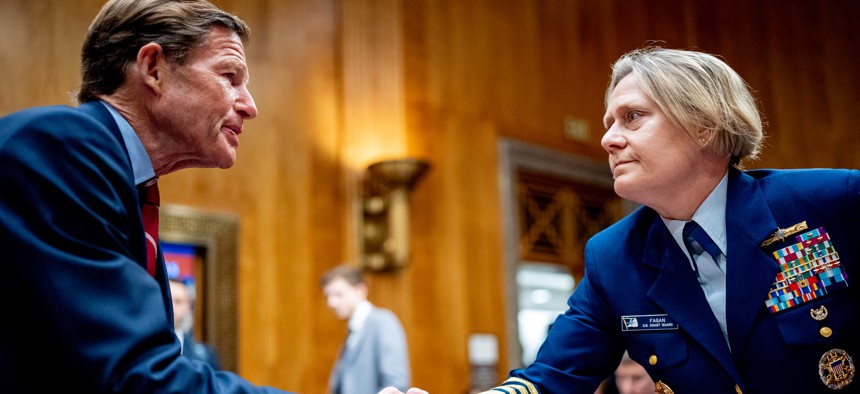
U.S. Coast Guard Commandant Linda Fagan speaks with Sen. Richard Blumenthal, D-Conn., before a hearing on Capitol Hill on June 11, 2024. Fagan has ordered numerous actions to improve the Coast Guard's culture since Operation Fouled Anchor was exposed. Andrew Harnik / Getty Images
Whistleblower hearing spotlights Coast Guard handling of sexual misconduct
Congressional investigations into sexual assault and harassment in the military branch began after a media report found the Coast Guard Academy covered up misconduct.
“Have you ever had a nightmare where you're in a crowd of people and someone is after you but you can't scream or run? That is what it felt like for me serving in the Coast Guard after my assaults,” testified Meghan Klement before a Senate panel on Thursday.
Klement, who served from 2012 to 2015, said that a bystander witnessed the harassment against her and reported it, but Coast Guard leaders then tried to intimidate her into silence and minimized her experiences.
After she made a video recounting what happened to her, multiple women reached out who said they were assaulted by the same individual, which is when Klement realized that she was not the first individual to report him.
“The command repeatedly allowed his behavior to slide and, in turn, left me to get assaulted by him,” she said.
Klement was one of five individuals, each of whom was sexually assaulted or harassed while in the Coast Guard, who spoke at Thursday’s hearing in New London, Conn., where the military branch’s academy is located.
Congressional scrutiny of sexual misconduct in the Coast Guard began with a 2023 CNN report that the military service in 2014 launched an investigation called Operation Fouled Anchor into alleged sexual assaults at the academy from the late 1980s to 2006. That investigation, which it kept secret from Congress, “found that school leaders routinely failed to report serious allegations to law enforcement, intentionally avoiding the criminal justice system.”
“The culture of cover up that hid Operation Fouled Anchor continues to this day, and that's the reason that we are here, so that the Coast Guard will, in fact, change course in the right direction and lead by example,” said Sen. Richard Blumenthal, D-Conn., who leads the Permanent Subcommittee on Investigations.
Ahead of the hearing, the subcommittee released a report with personal accounts from more than 80 individuals who shared their experiences with sexual assault and harassment in the Coast Guard. It found that a culture of shaming deterred victims from reporting, investigations failed to produce meaningful accountability and victims were retaliated against for reporting.
Blumenthal noted that “well over half” of the individuals in the report described misconduct that occurred on recent active duty. He also criticized the Coast Guard for being “late and lagging” in providing information to the panel.
Julian Bell, a chief warrant officer in the Coast Guard, said he wasn’t surprised when Operation Fouled Anchor was exposed.
“Everything clicked when Fouled Anchor was released. Of course, all this lying and coverup and obfuscation has been taught at the academy,” he said. “When a cadet harasses or assaults another cadet…and everything is swept under the rug, you’ve just taught the other 400 cadets how to handle a sexual assault or sexual harassment case.”
Individuals who testified repeatedly called for increased third-party oversight of the Coast Guard and argued that perpetrators, as well leaders who mishandle misconduct cases, should be publicly named to ensure accountability.
Following the publicization of Operation Fouled Anchor, Coast Guard Commandant Linda Fagan ordered a review that prompted 33 actions to improve the military branch’s culture. According to a July update to Congress, about half have been implemented, including a safe to report policy that protects victims and eyewitnesses who report sexual misconduct from being punished for minor collateral misconduct.
In the House of Representatives, Oversight and Accountability Committee Chairman James Comer, R-Ky., and National Security, the Border and Foreign Affairs Subcommittee Chairman Glenn Grothman, R-Wis., on July 26 requested interviews with four former senior officials, including two previous Coast Guard commandants, with respect to Operation Fouled Anchor and related matters.
Shawna Ward, who joined the Coast Guard in 1994, said during the hearing that she experienced sexual misconduct from right after she first joined to her most senior rank. After 24 years in the service, she observed that the culture never changed.
“During this time, I frequently put the Coast Guard ahead of my own family and missed precious moments with my children. I cherish the Coast Guard and really believed the culture would change,” she said. “Today, I look back and I wonder if it was all for nothing because the Coast Guard never made changing their culture a true priority.”







